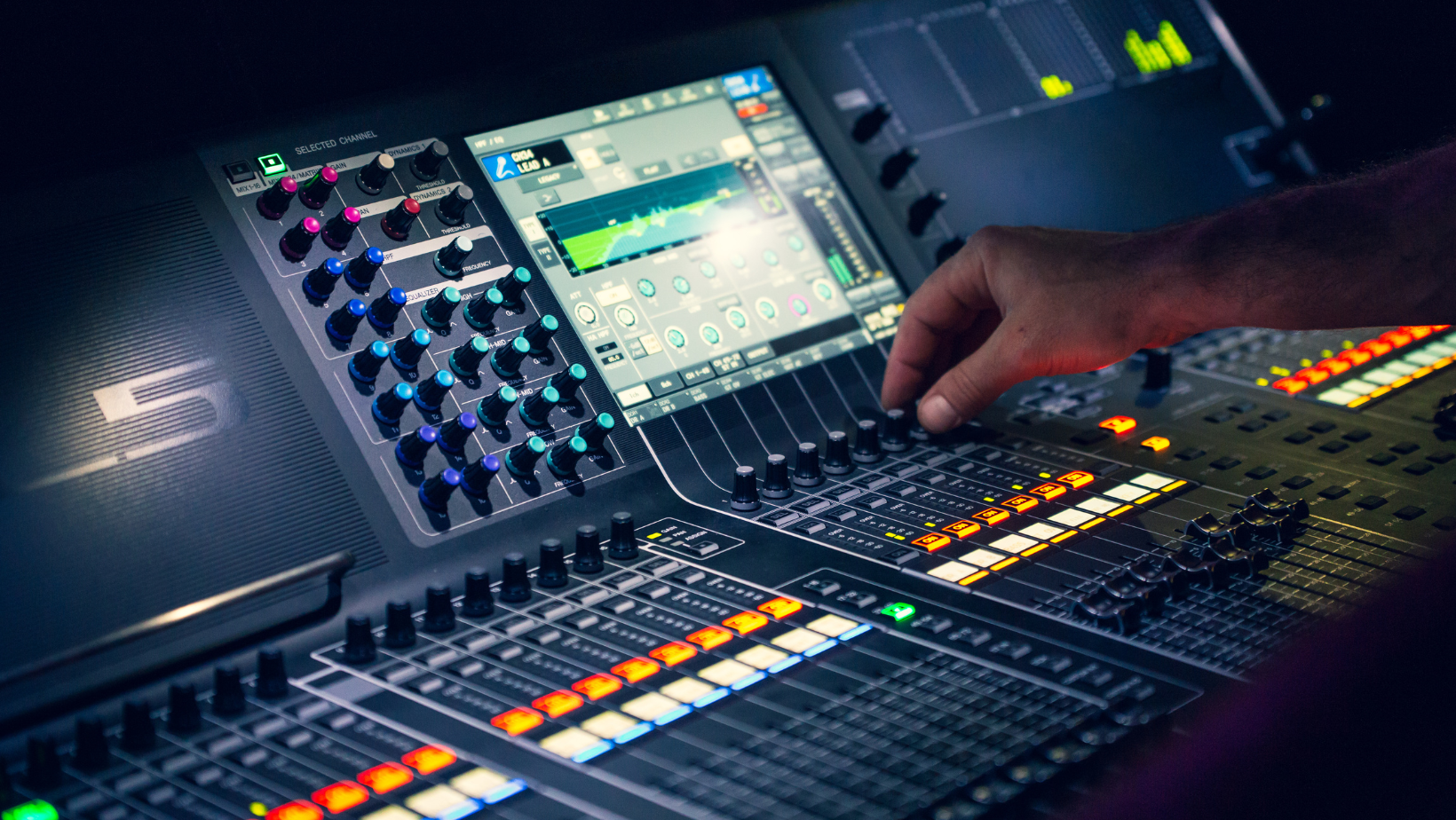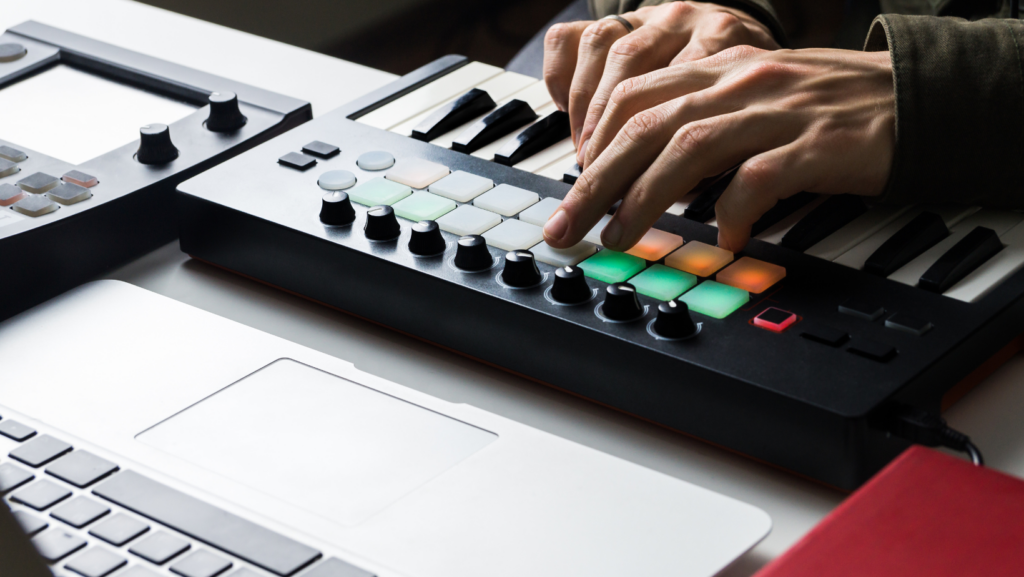In the grand symphony of human innovation, two players have continually taken the lead: music and technology.
So, let’s strike a chord and explore the dynamic relationship between music and technology — a melody that’s still being written.
Music and Technology
The progression of music, influenced by technological innovations, marks a captivating journey that shape the landscape of sound and expression. In line with historical context, music and technology plays a pivotal role in altering the dynamics of music perception as well as creation.
From Analog to Digital
 In the music industry, there was a time when analog ruled, characterized by vinyl records and cassette tapes. The music captured in this format had a warm sound to it, creating a tangible relation between the music and its listeners.
In the music industry, there was a time when analog ruled, characterized by vinyl records and cassette tapes. The music captured in this format had a warm sound to it, creating a tangible relation between the music and its listeners.
Yet, everything changed in the 1980s. That’s when digital took over, eventually marking the birth of Compact Discs (CDs). Boasting an enhanced sound quality, CDs provided listeners crisp, clear music without any physical degradation over time. Additionally, the digital format meant the music could be easily replicated, altering not only how we engaged with music but how it spread throughout the world. The transition from analog to digital commandeered a new wave of music creation and consumption that still echoes in our current music framework.
Impact of Streaming Services
In the past decade, technology’s relentless advancement knocked on music’s door yet again with the emergence of streaming services. Platforms like Spotify, Apple Music, and Amazon Music morphed the musical landscape, impacting artists and listeners alike.
For listeners, streaming services offer an unprecedented access to millions of songs at their fingertips. This accessibility, coupled with personalized recommendations, shapes the way audiences discover and interact with music.
Key Technological Advancements in Music Production
Taking into consideration the transformative impact of technology on the music landscape, this part of the discourse will delve into specific innovations that have made a significant mark. Two of such advancements: Digital Audio Workstations and Auto-Tuning fall under the limelight.
The Rise of Digital Audio Workstations
 Digital Audio Workstations, often shortened to DAWs, have undeniably revolutionized music production over the years. These are software platforms that streamline the process of recording, editing, and producing audio files. Since their inception in the early 80s, DAWs have seen a significant rise, bringing a paradigm shift in this industry. Famous instances include Pro Tools, Logic Pro, and Ableton Live, providing electronic producers an efficient platform to create, innovate, and experiment. The growth of DAWs embodies the democratization of music production, as it’s considerably less expensive and more accessible than traditional studio equipment. Thereby, empowering a new wave of independent and home-based artists.
Digital Audio Workstations, often shortened to DAWs, have undeniably revolutionized music production over the years. These are software platforms that streamline the process of recording, editing, and producing audio files. Since their inception in the early 80s, DAWs have seen a significant rise, bringing a paradigm shift in this industry. Famous instances include Pro Tools, Logic Pro, and Ableton Live, providing electronic producers an efficient platform to create, innovate, and experiment. The growth of DAWs embodies the democratization of music production, as it’s considerably less expensive and more accessible than traditional studio equipment. Thereby, empowering a new wave of independent and home-based artists.
| DAW | Release Year |
| Pro Tools | 1989 |
| Logic Pro | 1990 |
| Ableton Live | 2001 |
The Role of Auto-Tuning and Sound Engineering
 Auto-tuning is the subsequent technological advancement that has notably changed the sound of contemporary music. Initially developed in 1997, Auto-Tune corrects pitch in vocal and instrumental performances, ensuring they’re in tune, even when the original performance was off-pitch. Cher’s “Believe,” the first commercial track to prominently feature Auto-Tune, is firmly embedded in pop culture. But it’s not only the pop genre; Auto-Tune is pervasive across all music styles today.
Auto-tuning is the subsequent technological advancement that has notably changed the sound of contemporary music. Initially developed in 1997, Auto-Tune corrects pitch in vocal and instrumental performances, ensuring they’re in tune, even when the original performance was off-pitch. Cher’s “Believe,” the first commercial track to prominently feature Auto-Tune, is firmly embedded in pop culture. But it’s not only the pop genre; Auto-Tune is pervasive across all music styles today.
The marriage of music and technology has indeed been transformative. It’s propelled us from the era of vinyl records to streaming services, forever changing how we listen to and create music. Innovations like Digital Audio Workstations and Auto-Tuning have revolutionized music production, while VR and smart devices have enriched our listening experiences. Looking ahead, the advent of AI, blockchain, and Music NFTs promises to further reshape the music industry. They’re not just altering how music is created and distributed, but also how it’s consumed. These breakthroughs are pushing the boundaries, opening up thrilling opportunities for both creators and consumers. As technology continues to evolve, it’s clear that the rhythm of innovation will keep on playing, setting the stage for an even more exciting future in music.

